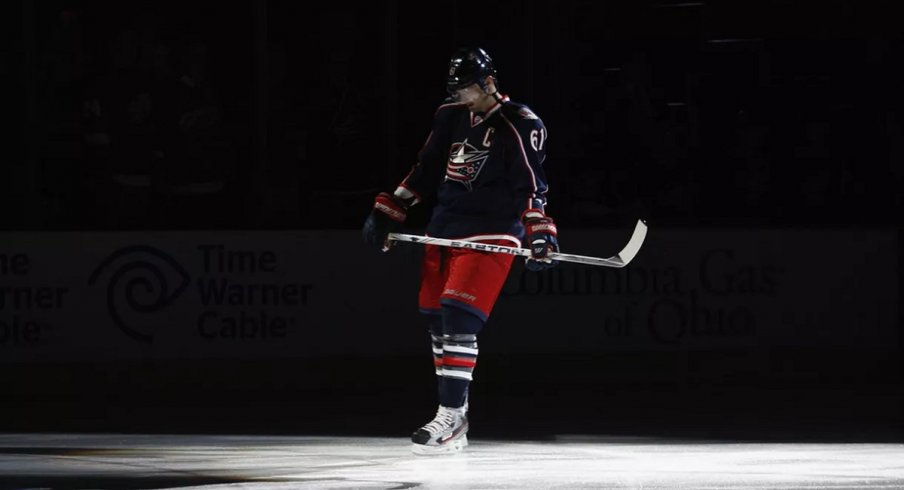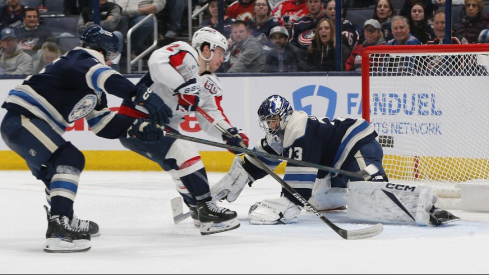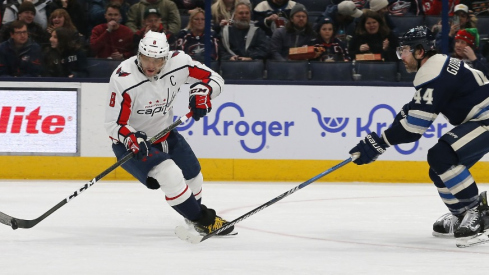Rick Nash.
For many of us, it's hard to even remember the Blue Jackets as a team before he came along.
But 1,060 NHL games, two Olympic Gold Medals, and one Rocket Richard Trophy later, and it's harder to fully grasp the impact he's had not just on the franchise, but on the growth of hockey in central Ohio. On Friday, his agent announced the 34-year-old would retire due to concussion-related symptoms.
After dominating the Ontario Hockey League (OHL) as a teenager, Nash was seen as a top prospect, but not the consensus top pick in the NHL Draft. The Blue Jackets, a mere two seasons into their existence, were desperately searching for a game-changing scorer.
Moments before the 2002 NHL Draft began, then-Blue Jackets GM Doug MacLean made a deal with the Florida Panthers that moved Columbus up to No. 1 overall and Florida to No. 3. MacLean dropped another bombshell when he took Nash with the first overall selection.
Nearly two decades later, Nash retires as the most accomplished player in his draft class by a country mile. His 805 career points dwarf the next closest player in his class (Alex Steen - 593).
It was a monumental move for the franchise, who were anything but blessed with a cupboard as well stocked from the expansion draft as the current Vegas Golden Knights.
At age 18, Nash stepped into the Blue Jackets lineup and was immediately one of the best players on the team – and certainly the most interesting. He finished third in the Calder Trophy race behind 21-year-old Barrett Jackman and 22-year-old Henrik Zetterberg.
As a 19 year old, the power forward took his game to a new level and found the back of the net 41 times, tying Ilya Kovalchuk and Jarome Iginla for the most goals in the NHL. It was the second best goal-scoring season of Nash's career.
At age 23, the (at the time) three-time NHL All-Star was named the fifth captain in Blue Jackets history. He would keep that title until he was traded to the New York Rangers.
Even today, Nash's legacy with many Blue Jackets fans is complicated.
In 2011-2012, the Blue Jackets weren't bad...they were atrocious. On Feb. 27, 2012, the club's 18-37-7 record put them beneath the league's basement dwellers. It was the NHL trade deadline, and teams were lining up to trade for the Blue Jackets star winger. But as the hours ticked, Nash remained in Columbus. It wasn't until GM Scott Howson spoke to the media that afternoon that the public was let in on a dirty secret.
From ESPN:
"Rick Nash, the biggest prize available, wasn't dealt before the NHL's trade deadline on Monday.
But the real shocker -- something almost no one knew until it was revealed by general manager Scott Howson later in the day -- is that it was Nash who had asked the Columbus Blue Jackets to trade him... As it turns out, it was the team captain's idea."
It wasn't until that summer that Nash was traded in a deal with the Rangers that changed the trajectory of the franchise forever. After the trade, he was chastised for suggesting that a trade would be a positive development for the Blue Jackets.
"I personally felt I could be a huge part of that towards bringing assets in. In my view, that was the best thing for the team, the organization, and personally for my career."
Could he have handled it differently? Absolutely. Should he have? Probably. It may have been a brazen thing to say at the time, but he was far from wrong. After nine seasons in Columbus, Nash left the club as the franchise's all-time leader in virtually every statistical category. He wasn't just the face of the franchise. He was the franchise.
Rick Nash Ranks in #CBJ History:
— Sportsnet Stats (@SNstats) January 11, 2019
GP - 674 (1st)
G - 289 (1st)
A - 258 (1st)
PTS - 547 (1st)
EVG - 192 (1st)
PPG - 83 (1st)
SHG - 14 (1st)
GWG - 44 (1st)
SOG - 2,278 (1st) pic.twitter.com/geHSLdPbG3
Many fans in Columbus still bristle over the rumors that Nash would have ended his career wearing the Union Blue once again, and were he healthy enough to return.
Fully believe Rick Nash would have played again for Blue Jackets if his concussion symptoms had faded. That was his preference. Had a great meeting with #CBJ brass last summer.
— Aaron Portzline (@Aportzline) January 11, 2019
But also feel like Nash made the right call. May he one day feel 100 percent again.
For those fans, I wonder aloud: why?
Rick Nash loved – and still loves – the city of Columbus. Even today, he calls Columbus home despite not having played in the capital city in over six years and being born in a different country. His impact in the local community was astounding and his legacy lives on to this day. He was the winner of the 2009 NHL Foundation Award, recognizing the "NHL player who applies the core values of hockey – commitment, perseverance and teamwork – to enrich the lives of people in his community."
During the glory years and even still in 2019, you could go to a local Chiller rink and be shocked by how many teams don't have a kid donning a No. 61 jersey. Imagine how many kids grew up going to an otherwise-listless hockey game in Columbus, but saw Rick Nash do something extraordinary and thought: I want to do that.
Nash played nine seasons with the Blue Jackets. His teams made the playoffs just once, and, hindsight being 20/20, that playoff berth had more to do with Ken Hitchcock dragging a bad team kicking and screaming into the playoffs than a legitimate team composition. Nash was wasting (yes, wasting) the prime years of his career and privately requested a trade from his GM. He wanted to be moved from a terrible team in a poor situation with no clear path towards relevance.
If you think you would have handled that any differently, you either have the patience of Ghandi or a the ignorance of a fool. To that, I say congratulations, or sorry.
The left winger retires as one of the most prolific scorers in recent NHL history. His 437 goals put him third among active NHL players in goals scored, ranking behind just Alexander Ovechkin and Patrick Marleau.
1,060 NHL games, a 6x NHL All-Star, and a 2x Olympic gold medallist. Congratulations to Rick Nash on an outstanding hockey career and all the best in retirement! pic.twitter.com/EB9l7lcH7Q
— NHLPA (@NHLPA) January 11, 2019
It's unlikely, but he may one day be inducted into the Hockey Hall Of Fame. While his career was sadly cut short due to concussions, who knows how many more goals were left in the tank? At a minimum, his jersey number should hang from the rafters of Nationwide Arena, mostly due to his franchise records but even more so because it's borderline blasphemous to imagine another player wearing No. 61 in this town.
His contributions with Team Canada and his six All-Star Games further evidence his dominance over the sport for a decade-plus. But even if he isn't, he will still go down as one of the most important figures in Blue Jackets history, and one of the sport's truly great ambassadors. He may have played for the Rangers and the Boston Bruins, but he enters retirement as a Blue Jackets legend, the only person on earth who can claim that title.
And that's not a bad legacy to leave behind.


